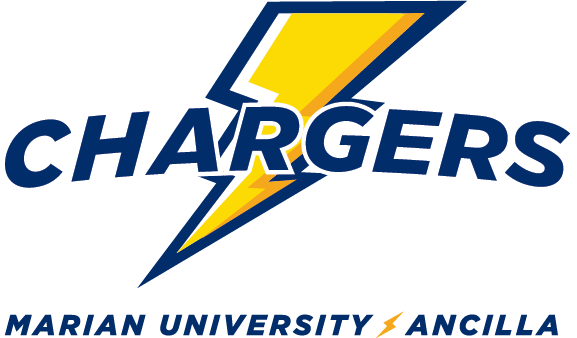Interested in careers in which you inform and influence others? Like to critique broadcasts by news media outlets and content published on social media? How about analyzing diverse communications and perspectives on topics like religion, science, and politics?
If this sounds like you, consider earning a degree in communication—we’ll help you gain the knowledge, skills, and experience to create messages that mean business.
Learn more about our Department of Communication and faculty

Communication Major

What Will I Study?
To earn a Bachelors in Arts (B.A.) in Communication at Marian, you will complete general education courses, a communication core, and elective courses designed to develop foundational intellectual and knowledge acquisition skills.
Foundational Intellectual Skills (12-13 hours)
- FYS110 First Year Seminar
- ENG112 Writing and Community
- COM101 Public Speaking
- Mathematics
- Science 100+ with lab
- HUM210 Meaning Through Culture
- PHL130 Human Nature & Person
- Foreign Language
- THL105 Introduction to Theology
Communication Major Core (39 hours)
- COM190 New Media and Digital Culture
- COM210 The Rhetorical Life
- COM221 The Art of Dialogue
- COM225 Strategic Writing for Communication
- COM250 Business and Professional Speaking
- COM310 Rhetorical Criticism
- COM360 Internship in Communication
- COM490 Senior Seminar
Elective Communication Courses
- COM223 Argumentation and Debate
- COM235 Oral Interpretation of Literature
- COM245 Fact Finding and Checking
- COM275 Intro to Film Production
- COM324 Digital Storytelling
- COM326 Digital Journalism
- COM330 Speech Writing
- COM332 Community Organizing
- COM333 Conflict Management
- COM352 Identity and Culture
- COM354 Myth and Metaphor
- COM365 Strategic Communication
- COM367 Writing for New Media
- COM 152: Information and Media Literacy
- COM 218: Media and Society
- COM 301: Theories of Media and Communication
- COM 382: Communication Ethics and Law
- COM 360/460: Internship in Communication
- COM 490: COM Capstone: Careers in Media and Communication
Specialization (18 credit hours)
Complete specialization in one of the following areas:
Creative Media and Journalism
Choose four classes from the following list:
- COM 204: Introduction to Media Production
- COM 346: News Reporting and Writing
- COM 426: Digital Journalism (COM 246 pre-req)
- COM 424: Digital Storytelling
- COM 367: Storytelling and Screenwriting
- COM 375: Film Production
- 3 credit hours of
- COM 206: Student Media: Journalism 207
- Student Media: Radio, 203
- Forensics and/or ENG 280
- Student Media: Literary Presses
Choose two classes from the following list:
- ART 129: Introduction to Graphic Design
- ART 255: Photography and the Moving Image
- ENG 210: Public Action Writing
- ENG 239: Professional Writing
- ENG 302: Creative Nonfiction Workshop
- ENG 204: Introduction to Creative Genres
- THE 120: Acting 1
- THE 130: Stagecraft
- THE 231: Design for Theatre 1
- THE 245: Drama Lit & Performance
- THE 450: Directing
Health and Strategic Communication
Choose four classes from the following list:
- COM 227: Introduction to Health and Strategic Communication
- COM 250: Business and Professional Speaking
- COM 368: Research Procedure for Communication
- COM 325: Strategic Writing for Communication
- COM 346: News Reporting and Writing COM 465: Communication Campaigns
- 3 credit hours of COM 203:
- Forensics
- COM 267 Student Media: Journalism and/or COM 256: Student Media: Radio, or
- ENG 280: Student Media: Literary Presses
Choose two classes from the following list:
- BUS 109 Business Plan Competition
- MKT 445: National Advertising Competition
- PBH 201: Public Health and Society
- ENG 239: Professional Writing
18 credits including COM 152: Information and Media Literacy
COM-152 Information & Media Literacy 3.00- This course examines the types of literacy needed to be an informed citizen in a media-saturated and information-heavy world. Students will think and write critically about information and media to become more active consumers of content and capable of sifting through many types of media and informational content.
COM-203 Forensics 1.00-2.00 In this enhancement course, students are provided with academic instruction in prepared, extemporaneous, and impromptu speaking as well as the oral interpretation of literature as they prepare for intercollegiate competition. Students enrolled in this course must participate in the Marian University Speech Team and travel to tournaments. Enhancement courses, such as COM-203, may be repeated for credit, with a maximum of 12 credits earned toward a bachelor’s degree or six credits toward an associate degree.
COM-204 Media Production 3.00- This course introduces students to the basic technologies used to create media content. This includes photography, audio, and video production technologies. It provides students with hands-on experience in creating media with different production software. It supplies students with necessary foundational digital knowledge to remain adaptive to the ever-changing operational landscape of production and post-production technologies and software.
COM-206 Student Media: Journalism 1.00- In this enhancement course, students create and manage content for The Phoenix, the cocurricular student newspaper and digital media outlet. Enhancement courses, such as COM206, may be repeated for credit, with a maximum of 12 credits earned toward a bachelor's degree or six credits toward an associate degree. Graded S/U.
COM-207 Student Media: Radio 1.00- In this enhancement course, students create and manage content for The Siren, the cocurricular online radio outlet. Enhancement courses, such as COM 207, may be repeated for credit, with a maximum of 12 credits earned toward a bachelor's degree or six credits toward an associate degree. Graded S/U.
COM-218 Media and Society 3.00- This course is an examination of the effect and impact of mass media on contemporary life and society. It covers both the historical evolution of media as well as contemporary developments and issues. Every Fall Even Years
COM-227 Intro to Health & Strategic Commun. 3.00- This course explores strategic communication in health communication settings. Content includes campaign elements (advertising, public relations, sales promotion, direct marketing, and databases and Internet) and is designed to showcase the processes that drive organizational objectives. Every Spring
COM-250 Business & Professional Speaking 3.00- Prepares students for public speaking in business and professional contexts such as meetings, job interviews, sales pitches, training seminars, and motivational storytelling. Develops concepts critical to professional communication: leadership, group dynamics, technological literacy, cultural competence, and constructive criticism. Take COM-101. (Required, Previous).
COM-301 Theories of Media & Communication 3.00- This course provides an overview of the concepts, theories and tools needed to design, conduct, interpret, and critically evaluate media and communication practice and research. Every Spring
COM-325 Strategic Writing for Communication 3.00- In the context of an internet-mediated and diverse communications industry, this course equips students for writing in the field of strategic communication. Students write for a variety of audiences across several genres and media as they produce texts for public relations and internal communications. Students review the fundamentals of grammar and style alongside an introduction to visual rhetoric as they create multiple-media compositions in career settings. Take ENG-112. (Required, Previous). Every Fall Odd Years
COM-346 News Reporting and Writing 3.00- Covers the two main tenets of journalism-reporting and writing the news. Students will evaluate news and newsworthiness. They will discuss and practice interviewing, reporting, and writing various types of stories. Take ENG-112. (Required, Previous). | Take COM-204. (Recommended, Previous). Every Fall
COM-360 Internship/Practicum in Communication 3.00- An approved internship or work experience related to a particular area in communication. The field experience is contracted between the student and the cooperating agency with the approval of the department liaison. The contract includes goals, procedure, requirements for credit, supervision and evaluation criteria. Graded S/U. Take 62 credits. (Required, Previous).
COM-367 Storytelling and Screenwriting 3.00- This course introduces the basic skills, professional standards, and creative challenges of writing for fictional mediated texts. Students learn the composing processes and practices of writing, design, and group-work skills needed in creative media industries. Take ENG-112 or ENG-115. (Required, Previous). Every Fall
COM-368 Research Procedures for Communication 3.00- This course is to help students build skills for designing, conducting, interpreting, and presenting research related to strategic communications. These include the basics of qualitative and quantitative research methods and data analysis, techniques for measuring key concepts in strategic communications, and ethical conduct of research. Every Fall Odd Years
COM-375 Intro to Film Production 3.00- This course combines an introduction to film theory with the hands-on experience of film production. Students explore how film history, criticism, narrative, and genre influence film production. Students then work as directors and crew members on narrative or non-narrative short films - and critique the finished products. Learning the basics of cinematography, editing, sound, and production design, students explore the ins and outs of filmmaking from inception to completion. Take COM-204. (Recommended, Previous). Every Spring Even Years
COM-382 Media Ethics and Law 3.00- This course explores the relevant laws and ethical questions concerning the production and consumption of media in the 21st century. Students apply the principles of media law and ethics to situations they are likely to face in their personal and professional lives. Every Fall
COM-424 Digital Storytelling 3.00- This class explores crafting stories with digital video and audio tools. Through the analysis and creation of various digital and interactive media, students learn digital production skills and the principles of narrative logic for creative communication. Take COM-204. (Recommended, Previous). Every Fall
COM-426 Digital Journalism 3.00- Digital journalism is an advanced course that covers the two main tenets of journalism reporting and producing news. Students will produce in-depth news stories with an eye towards advanced research techniques. They will go beyond written work. They will produce audio and video news packages. They'll engage in photojournalism and explore infographics and visual data techniques. Take COM-346. (Required, Previous). Every Spring
COM-460 Internship/Practicum in Communication 3.00- An approved internship or work experience related to a particular area in communication. The field experience is contracted between the student and the cooperating agency with the approval of the department liaison. The contract includes goals, procedure, requirements for credit, supervision and evaluation criteria. A maximum of six credits may be earned, of which three credits may apply toward the major. Graded S/U. Take 62 credits. (Required, Previous).
COM-465 Communications Campaigns 3.00- Students will investigate how a communication campaign functions, explore how media can be used to affect attitudes and behavior, and develop a campaign for a real-world client. These campaigns will include extensive research, planning, execution, and evaluation elements and will culminate with an oral presentation. Every Spring Odd Years
COM-490 MDC Capstone: Influence & Impact 3.00- A departmental seminar for majors in English, Art and Design, and Communication. In this community-engaged course, students will research contemporary issues and themes via their disciplinary perspectives. By utilizing diverse applications, incorporating research, and working collaboratively, students will address community-identified issues and concerns. Take 94 credits. (Required, Previous). Every Fall
Why Choose the B.A. in Communication at Marian?
Students who major in communication study all the ways that words and symbols shape how we view the world around us.
As a communication major at Marian, you can expect to:
- Work closely with faculty advisors to develop a personal plan of study that fits your interests and goals.
- Complete a high-impact, experiential curriculum grounded in the liberal arts, rhetoric, and our Franciscan values.
- Gain real-world, hands-on experience through internships, research projects, and community engagement courses.
- Learn how to analyze context, credibility, and ideology in contemporary media.
- Build a professional portfolio showcasing your work.
- Explore your spirituality and faith on a close-knit Catholic campus that welcomes students from all faith traditions.
Double-Down with a Double Major
A communication degree is a natural fit for students interested in double majors. You can earn TWO undergraduate degrees with a standard course load each semester. Several courses count toward both majors, thereby reducing the overall number of required classes. These pairings include the B.A. in communication and:
- B.S. in marketing
- B.A. in graphic design
For complete descriptions of requirements, review our catalog of courses and course sections and undergraduate catalog of programs. Click the button to download a sample four-year plan of study and course checklist.
What are your career paths?
You will have lots of flexibility and versatility in the careers you can pursue.
According to the Bureau of Labor Statistics, here are some of the nation’s most common communication occupations, including projected growth in employment demand and median pay.
* Includes positions like social media coordinator and social media specialist.
** Includes content, digital media, and social media manager.
*** Includes web, social media, and streaming video sites.


"I feel fortunate Marian provided me with the knowledge, support, and resources I needed to pursue my educational and career goals."
